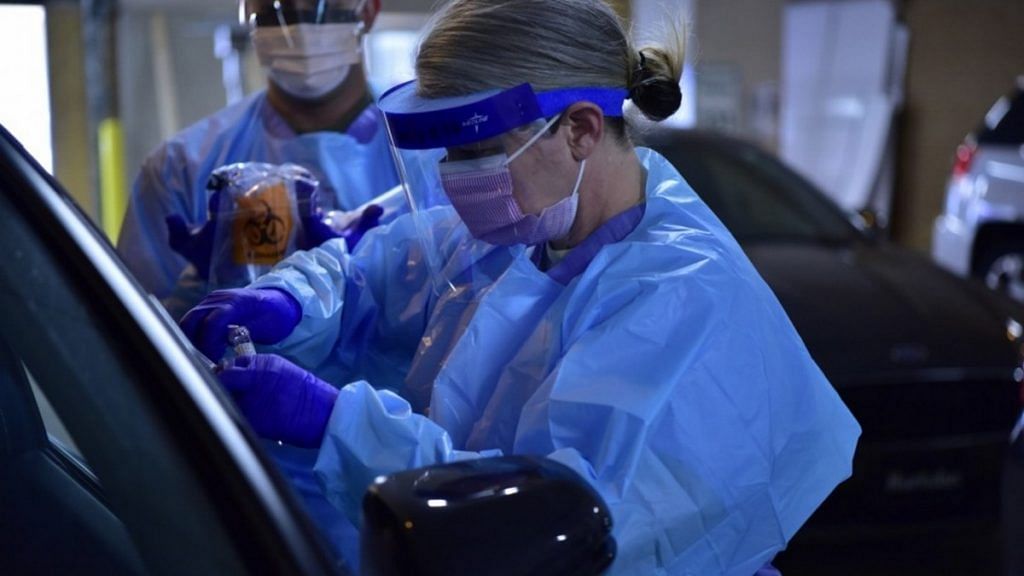New Delhi: With coronavirus positive cases surging across the world and hospitals filling up fast, parking lots in the US, UK, UAE, Germany and South Korea have now been turned into drive-thru testing centres for Covid-19.
In just five minutes, these testing sites can take a nasal or throat swab of an individual and determine if they are infected.
Drive-thrus are usually associated with fast-food restaurants where a customer need not even step out of her or his car to collect the order. This concept is now being used to fast-track testing for Covid-19.
Parking lots at hospitals, parks, colleges and stadiums have been converted into testing sites. The Hard Rock Stadium in Miami, Abu Dhabi’s Zayed Sports City and a theme park in the UK called Chessington World of Adventures are some of the examples.
Germany has also begun testing people via drive-thru centres, with a few sites set up in Nuertingen and Gross-Gerau.
A drive-thru testing centre can test approximately 300 people daily depending on the size of the parking lot and number of medical staff. The concept, however, has also been criticised in places with limited medical staff or where testing kits are scarce.
Also read: Develop test kits, identify drugs: Science ministry calls for rapid projects against Covid-19
The procedure
Though the procedure may vary in each nation, almost all drive-thru testing facilities require a pre-screening — where people are required to answer questions related to their health condition. In some cases, only first responders, healthcare workers and those above 65 years are eligible to get tested.
Covid-19 hotlines in Arizona and New York City have been linked to drive-thru visits.
In UAE, the test is free and prioritised for the elderly, pregnant women or people with chronic diseases. For others, the testing procedure costs approximately Dh370 (Rs 7,578).
South Korea, which launched drive-thru sites in February as part of its “aggressive testing” approach, has made these tests free.
In most countries, an individual must bring a photo ID to get tested at parking lots.
While she or he remains in the driver’s seat, a medical professional wearing protective gear conducts a nasal or throat swab that takes about five minutes. This swab is then sent to a laboratory for testing and the individual will be advised to self-isolate for 2-3 days while results are being prepared.
Medical professionals are advised to wear a new set of protective gear for each test.
In a 1.5 minute video, BBC’s health editor Hugh Pym has shown how the procedure is done at a healthcare centre in London.
Problems with drive-thru testing facilities
Limited medical staff, scarce testing kits and protective gear are some of the major hurdles in implementing drive-thru testing facilities.
Small clinics like ProHealth, a New York-based health centre with six drive-thru sites across the city, saw 167 patients on the first day it opened a facility and 212 the next.
“I should have thought it through better. I didn’t fully anticipate the pent up demand,” said ProHealth’s Dr Zayed Baker.
Supply limitations have also forced medical staff to reuse hazmat suits or spray them with disinfectants after a test, putting them at a higher risk of infection.
Limited testing kits is another problem. The four sites of Banner Health System in Arizona have been witnessing a slow supply of kits.
Despite 30 states in the US adopting drive-thru sites, many centres have shut down completely due to shortages of supplies and staff. Patients across the US have also complained of delays in appointment confirmation and receiving test results.
Also read: How the novel coronavirus is mutating, and if you should be concerned
